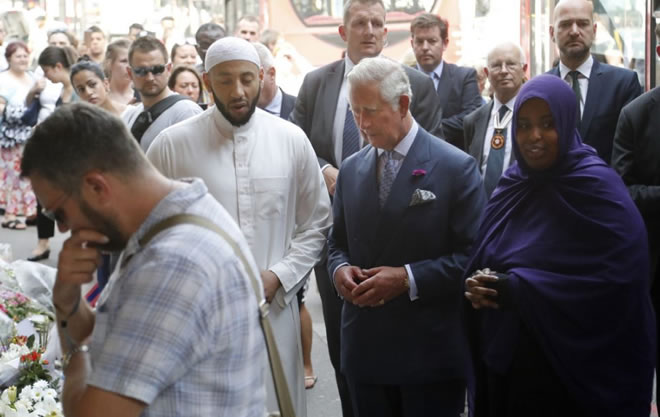
by Azeezah Kanji
Saturday, July 01, 2017

Prince Charles, centre, speaks to Muslim leader Mohammed Mahmoud, centre left, as he visits the Muslim Welfare House, Finsbury Park, to meet members of the local community on June 21 and hear about the community response following the recent extremist attacks in London. (Frank Augstein / AP)
In response to criticisms that the term “terrorism” is applied almost exclusively to violence by Muslims, political leaders have been quick to describe recent acts of violence against Muslims as “terrorism” too.
Justin Trudeau condemned Alexandre Bissonnette’s shooting spree at the Centre Culturel Islamique de Quebec in January as a “terrorist attack”; British Prime Minister Theresa May likewise denounced Islamophobia as a type of “extremism” after Darren Osborne’s fatal assault on Muslim worshippers outside a mosque in Finsbury Park last week.
These pronouncements have been hailed as strikes against Islamophobia — but they are more likely to exacerbate the problem than exorcise it. Framing Islamophobic violence as “terrorism” leads to the dangerous conclusion that state anti-terrorism powers — which have been wielded disproportionately against Muslims, Indigenous peoples, and other communities of colour — should be strengthened in the name of protecting Muslims.
For the last sixteen years, Western liberal democracies have used the statistically minuscule risk of Muslim “terrorism” to rationalize sprawling systems of Kafkaesque counterterrorism: preventive arrests and indefinite detentions without charge; surveillance of schoolchildren for “radical” ideology; entrapment of vulnerable people in “terrorism” plots developed by state informants; criminalization of dissent and other forms of previously free expression; use of secret evidence in trials; torture and complicity with torture outsourced to other regimes; and extrajudicial killings (by the U.S. and the U.K., including against their own citizens).
Now, attacks against Muslims are being similarly exploited to further entrench and inflate counterterrorism programs. The Quebec mosque shooting was spun into a
vindication of Donald Trump’s draconian national security measures by the White House: “it’s a terrible reminder of why ... the president is taking steps to be proactive rather than reactive when it comes to our nation’s safety,” said press secretary Sean Spicer.
One of these “proactive” presidential steps was the “Muslim ban” announced just a few days before Bissonnette went on his anti-Muslim rampage in Quebec.
Following the attack in Finsbury Park, Prime Minister May pledged to combat hatred of Muslims by possibly increasing the counterterrorism powers of police and security services (even though an official review recently concluded that these powers are already adequate), and by establishing a Commission for Countering Extremism that will “work to stamp out extremist ideology in all its forms” (including non-violent ones).
The expansion of state efforts at ideological surveillance and control will not correct counterterrorism’s abuses, but compound them. The equalization of unfreedom is not progress toward justice.
In any case, Islamophobic and White-supremacist ideologues are unlikely to experience the kind of collective suspicion and pre-emptive intervention suffered by Muslims stigmatized en masse as “security threats.” Even after Bissonnette’s act of anti-Muslim mass murder, which alone killed three times as many people as Muslim “terror” ever has in Canada, Islamophobia remains publicly marginalized on the national security agenda.
In May, the mayor of Quebec City opposed a proposal to extend the province’s deradicalization program, which is currently focused predominantly on Muslims, to address the radicalism of the far-right.
Earlier this month, the RCMP responded to a Vice report on an armed anti-Islam “patriot” group called the III%, which has hundreds of members and conducts live fire paramilitary training exercises, by stating that it “does not investigate movements or ideologies,” only “criminal activity.”
“It needn’t be said how immensely different ... law enforcement would view a few dozen Muslim men and women doing similar training and/or making shows of force,” said Vice journalist Mack Lamoureux.
The branding of individual murderous Islamophobes as “terrorists” attempts to deflect charges of racism against security practices that continue to target Muslims.
But it is hardly surprising that Darren Osborne and Alexandre Bissonnette would hate Muslims, when political leaders, such as Theresa May, have trafficked in unfounded theories that Muslims are plotting to take over British schools; when laws like Canada’s Zero Tolerance for Barbaric Cultural Practices Act inaccurately imply that Muslims are uniquely, “barbarically” oppressive towards women; when official public safety reports fixate almost entirely on Muslim threats while largely overlooking far-right groups, responsible for many more deaths and assaults; and when counter-radicalization programs like Britain’s Prevent legitimize the belief that Muslims need to be monitored by their fellow citizens for signs of “violent extremism.”
This is the fundamental problem with calling Islamophobic violence “terrorism”: it represents state counterterrorism as the solution to anti-Muslim “extremism,” while ignoring the role of the state itself in propagating the myth that Muslims are the ultimate menace.
A counterterrorism apparatus built around the idea that Muslims are dangerous cannot be used to make Muslims safe.
Azeezah Kanji is a legal analyst based in Toronto. She writes in the Star every other Thursday.